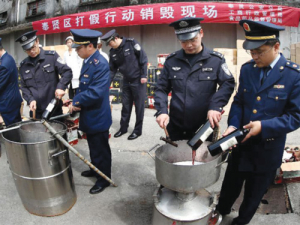China’s new beef tariffs expected to favour New Zealand exporters
Additional tariffs introduced by the Chinese Government last month on beef imports should favour New Zealand farmers and exporters.
 Counterfeiting isn’t going unnoticed in China, as this picture shows. Police have been brought in on numerous occasions to destroy products of counterfeiters.
Counterfeiting isn’t going unnoticed in China, as this picture shows. Police have been brought in on numerous occasions to destroy products of counterfeiters.
An invisible ‘tracer’ mixed with paint, plastics or ink and applied to wine bottle closures, corks or labels is the latest high-technology product developed to counter the growing trend of counterfeit wine.
It has been produced by Australian anti-counterfeit and product authentication company YPB Group Ltd and was released at this years 16th Australian Wine Industry Technical Conference and Trade Exhibition.
Counterfeit wine is an on-going and growing concern for winemakers the world over, and has reared its head in China over recent yearas.
Independent wine commentator Jeremy Oliver estimates up to 50% of wine costing $35+ per bottle sold in China is fake – either with a fake label, a refilled bottle or a copycat brand.
“Early counterfeit wine was easy to spot in China, because the labels were inferior, the English on the labels was unusual, and even the bottle shapes were often incorrect,” Oliver said. “But lately wine counterfeiters have become more professional. They are putting fake wine labels on cleanskin bottles, or refilling empty bottles with inferior wine – often from countries like Chile and Argentina – and then recorking and recapping them.”
Oliver said; “I have heard stories that the average bottle of Champagne in China is filled seven times and in November 2012 police in Wenzhou Province seized nearly 10,000 bottles of counterfeit Chateaux Lafite Rothschild. Estimates are that around 30 million bottles of so-called Chateau Lafite are sold in China each year, from a winery whose total production is around 200,000 bottles and whose China allocation is around 50,000 bottles.”
YPB has led the market in combatting counterfeiting – particularly in the wine industry through a mix of Invisible tracer technology and the use of QR codes and NFC technologies.
YPB is the only company able to offer an end-to-end solution covering authentication and connecting brand owners with their consumers through their YPB Connect Platform.
YPB Group’s tracer is made under a patented process from rare earth inorganic materials, it is invisible, indestructible, unable to be copied, and can be incorporated into almost any material. In the case of wine it can be applied to the capsules that cover the tops of wine bottles, wine labels or boxes. Hand-held readers detect the tracer on the packaging or bottle thereby proving the authenticity of the product. The hand-held readers, which can be used by distributors, wholesalers, and retailers are inexpensive and simple to use.
YPB’s tracer can be used to protect many types of goods including food, wine and clothing. It meets FDA Food contact standards in China, Europe and USA.
John Houston, executive chairman of YPB Group, said global counterfeiters were growing in sophistication, affecting both consumers and manufacturers. “Consumers are often not getting what they think they are buying and manufacturers’ brands are at risk,” he said. “Each year the worldwide counterfeit trade in all goods is worth $US 1.7 trillion. More and more companies are realising that nothing will change unless they actively combat the counterfeit trade.”
YPB’s anti-counterfeit technology has also been adopted by governments and is currently in 18 million e-passports worldwide. ν
The large 2025 harvest will exacerbate the wine industry's "lingering" supply from recent vintages, New Zealand Winegrowers Chief Executive Philip…
If you find a new consumer in a developed wine market, you are taking them from someone else, says Blank…
From removing stink bug taint from one wine to balancing excessive bitterness in another, a New Zealand-grown technology is helping…